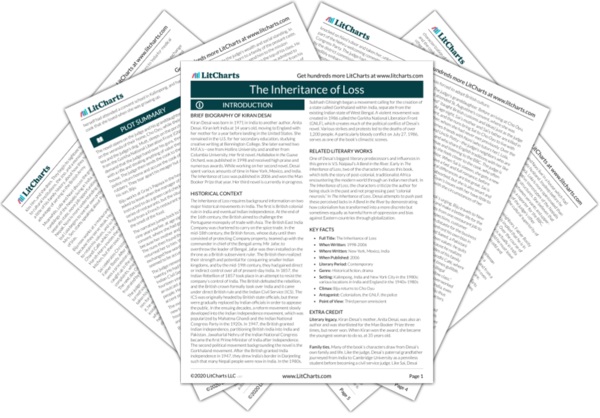Colonialism and Globalization
The Inheritance of Loss takes place in the 1980s between two worlds: the austere, upper class home of the judge and Sai at the foot of Mount Kanchenjunga in the Himalayas, and an assortment of New York City restaurants where Biju works. With India still just beginning to establish itself as an independent nation less than 40 years after the end of British colonial rule, and New York continuing to experience waves of immigration, the…
read analysis of Colonialism and GlobalizationPoverty vs. Privilege
The characters in Desai’s novel have diverse economic backgrounds, from the judge’s wealth to the poverty of the cook. In The Inheritance of Loss, the gulf between those with extreme privilege and those living in poverty is generally shown to be a direct consequence of the legacy of colonialism. Though privilege comes in many forms, Desai illustrates the vicious and self-reinforcing cycle of class privilege by showing how those who have privilege…
read analysis of Poverty vs. PrivilegeHome and Belonging
As the story stretches itself between two worlds and several different cultures, many of the characters experience alienation from the different places they inhabit. Each character, in their own way, exhibits a yearning for home. Biju seeks out a restaurant in New York City that serves Indian food; Gyan and the boys in the GNLF work to establish a political state they can truly call home. The book shows home is a place that is…
read analysis of Home and Belonging
Gender and Misogyny
The Inheritance of Loss examines the dynamics of two relationships in the colonial and post-colonial world: the judge and Nimi’s, and Sai and Gyan’s. These relationships develop many years apart, but they contain similar patterns. When there is equality between the partners in each relationship, the relationships remain gentle and even loving. However, when the men in these relationships begin to believe themselves superior to their female partners, any challenges to this superiority…
read analysis of Gender and MisogynyPower and Humiliation
Throughout the novel, various characters express feelings of humiliation. Most of the time, these feelings are caused by the actions of someone else in a more powerful position. Though power and humiliation are not necessarily opposites, The Inheritance of Loss illuminates a correlation between the two as Desai paints a portrait of a society wherein humiliation is used as a tool by some to retain power over others.
The novel begins as young boys from…
read analysis of Power and Humiliation






